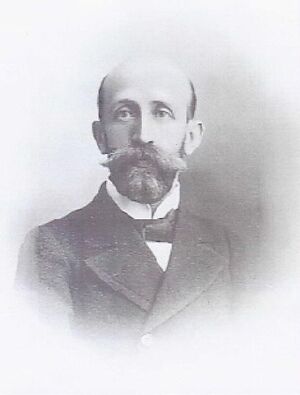Dmitry Mirimanoff (nonfiction): Difference between revisions
No edit summary |
No edit summary |
||
| (One intermediate revision by the same user not shown) | |||
| Line 22: | Line 22: | ||
* [[Mathematician (nonfiction)]] | * [[Mathematician (nonfiction)]] | ||
* [[Mathematics (nonfiction)]] | * [[Mathematics (nonfiction)]] | ||
* [[Mirimanoff's congruence (nonfiction)]] - in [[Number theory (nonfiction)|number theory]], one of a collection of expressions in modular arithmetic which, if they hold, entail the truth of Fermat's Last Theorem. Since the theorem has now been proven, these are now of mainly historical significance, though the Mirimanoff polynomials are interesting in their own right. | |||
* [[Wieferich prime (nonfiction)]] - in [[Number theory (nonfiction)|number theory]], a prime number p such that p2 divides 2p − 1 − 1, therefore connecting these primes with Fermat's little theorem, which states that every odd prime p divides 2p − 1 − 1. Wieferich primes were first described by [[Arthur Wieferich (nonfiction)|Arthur Wieferich]] in 1909 in works pertaining to Fermat's last theorem, at which time both of Fermat's theorems were already well known to mathematicians. | |||
* [[Mirimanoff prime (nonfiction)]] - primes ''p'' such that ''ap'' − 1 ≡ 1 (mod ''p''2) for fixed integer ''a'' > 1. | |||
* [[Arthur Wieferich (nonfiction)]] - mathematician and teacher, remembered for his work on number theory. | |||
External links: | External links: | ||
Latest revision as of 08:43, 29 August 2019
Dmitry Semionovitch Mirimanoff (Russian: Дми́трий Семёнович Мирима́нов, 13 September 1861, Pereslavl-Zalessky, Russia – 5 January 1945, Geneva, Switzerland) was a mathematician and academic.
Mirimanoff made notable contributions to axiomatic set theory and to number theory (relating specifically to Fermat's last theorem, on which he corresponded with Albert Einstein before the First World War). In 1917, he introduced, though not as explicitly as John von Neumann later, the cumulative hierarchy of sets and the notion of von Neumann ordinals; although he introduced a notion of regular (and well-founded set) he did not consider regularity as an axiom, but also explored what is now called non-well-founded set theory and had an emergent idea of what is now called bisimulation.
Mirimanoff became a member of the Moscow Mathematical Society in 1897.
In the News
Fiction cross-reference
Nonfiction cross-reference
- Mathematician (nonfiction)
- Mathematics (nonfiction)
- Mirimanoff's congruence (nonfiction) - in number theory, one of a collection of expressions in modular arithmetic which, if they hold, entail the truth of Fermat's Last Theorem. Since the theorem has now been proven, these are now of mainly historical significance, though the Mirimanoff polynomials are interesting in their own right.
- Wieferich prime (nonfiction) - in number theory, a prime number p such that p2 divides 2p − 1 − 1, therefore connecting these primes with Fermat's little theorem, which states that every odd prime p divides 2p − 1 − 1. Wieferich primes were first described by Arthur Wieferich in 1909 in works pertaining to Fermat's last theorem, at which time both of Fermat's theorems were already well known to mathematicians.
- Mirimanoff prime (nonfiction) - primes p such that ap − 1 ≡ 1 (mod p2) for fixed integer a > 1.
- Arthur Wieferich (nonfiction) - mathematician and teacher, remembered for his work on number theory.
External links:
- Dmitry Mirimanoff @ Wikipedia
